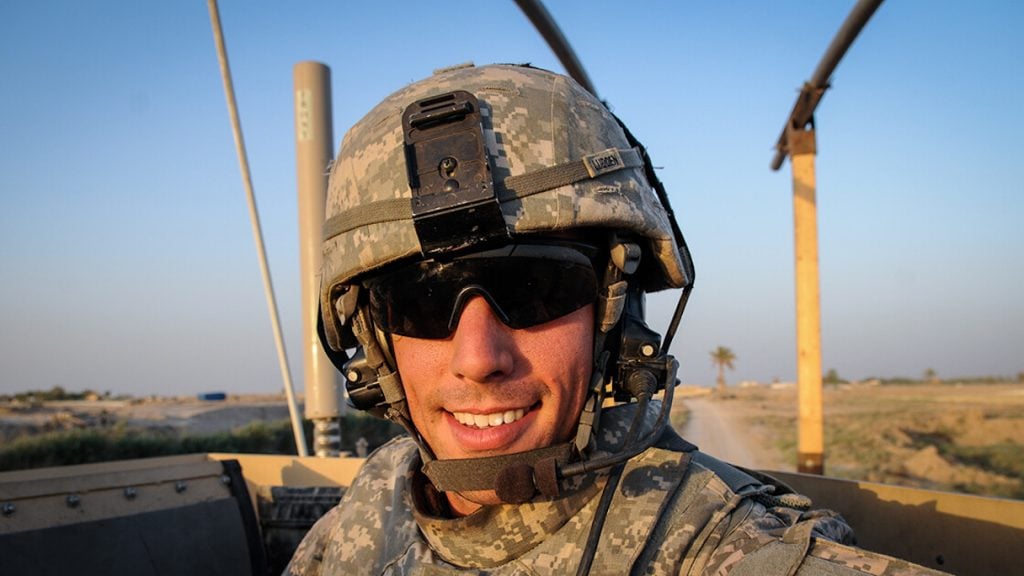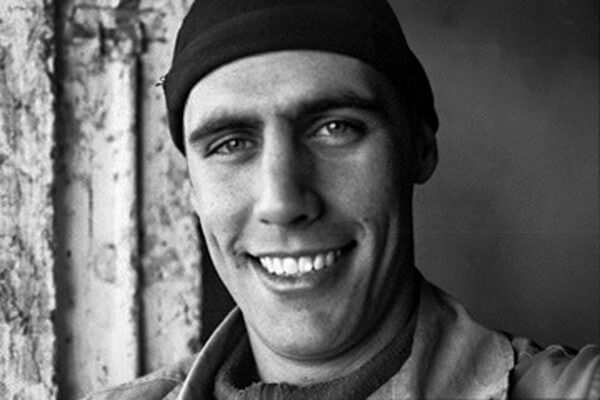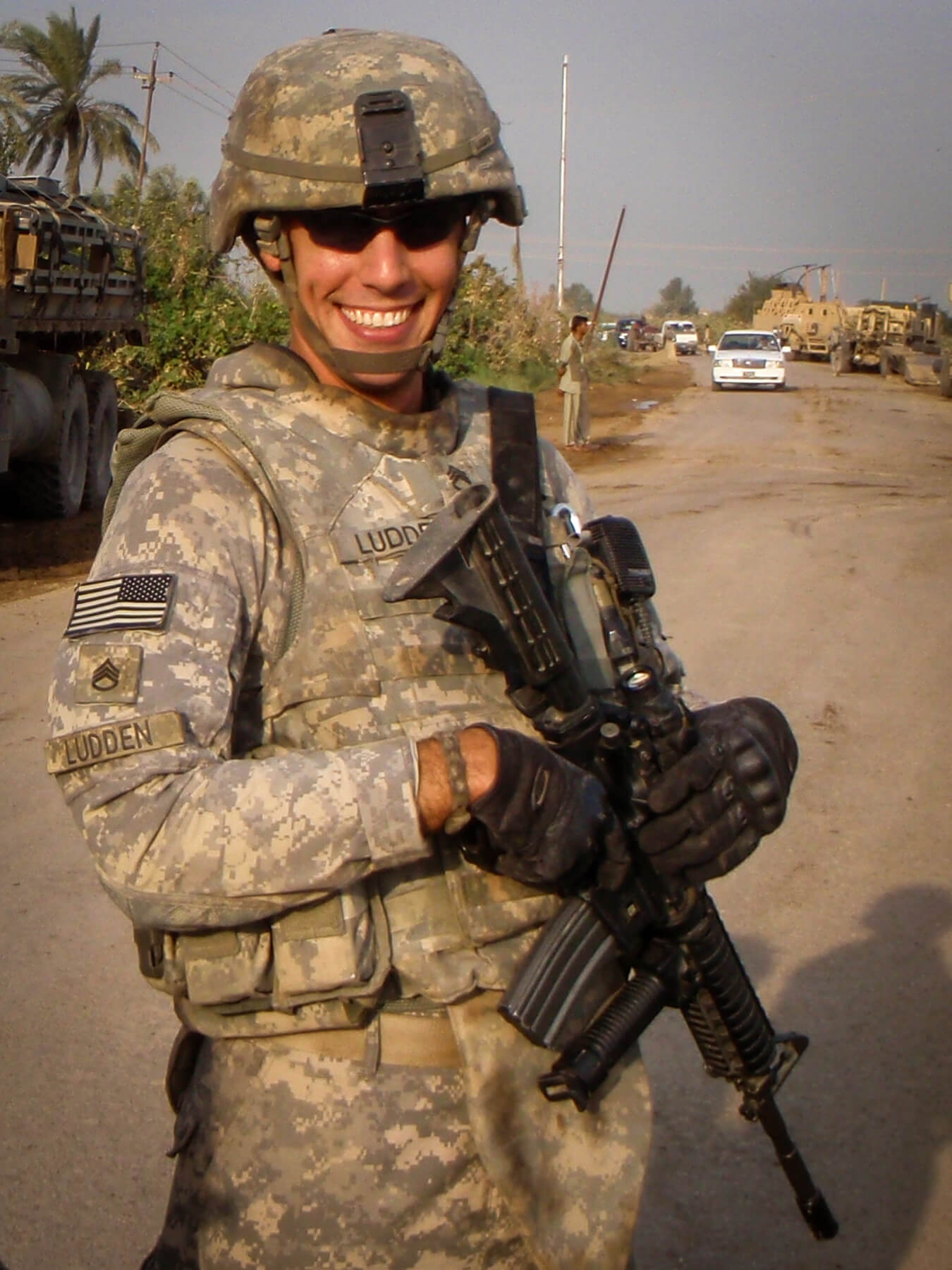
By Martin Ludden | Rewire
PBS premiered Going to War, a new documentary about the veteran experience, on Memorial Day, Monday, May 28. Inspired by the film, Rewire asked veteran Martin Ludden to recount his experiences going to war as a young adult.
I graduated from basic training on August 17th, 2001. After dropping out of college and working my way through three different St. Paul pizza establishments, my dad made a well-timed suggestion and I enlisted in the United States Army Reserve as a bridge engineer. My unit, the 652nd Engineer Company, was based in Ellsworth, Wisconsin, the seat of Pierce County and the Cheese Curd Capitol of Wisconsin.
The math was easy for me. I had been a Boy Scout, done four years of Junior ROTC in high school, had always thought about the military as an option, and knew it was a good route back to school and out of the pizza business. So off I went in April of 2001 to Ft. Leonard Wood, Missouri, to become a soldier.
Getting the call
Immediately upon graduation, I enrolled at the University of Minnesota and was sitting on campus when the planes hit the World Trade Center and we began the slow march towards war.

Some time in 2002, the equipment at our reserve center in Ellsworth began to change colors as the Army started replacing our green trucks and Humvees with tan ones.
Meanwhile, as a staff photographer for the “Minnesota Daily,” I covered the campus protests and counter-protests. I watched the pageantry play out through a telephoto lens knowing at some level that we were going to war. That I was going to war.
The call finally came on Valentine’s Day, 2003. It was a Friday and my First Sergeant ordered me to report to Ellsworth for mobilization on Sunday. I had 36 hours to get things in order and get ready to go to a war that hadn’t even started yet. I was scared. I was anxious. I was excited.
Here we were, a group of trained professionals who were pretty damn good at what we did – which was building bridges – and we were going to get to do it for real. It was exhilarating. I was going to war for the first time.
Midwestern kids in the desert
We arrived in the barren desert that is Kuwait barely a week after the invasion and soon headed north via convoy. Throngs of people greeted us as we worked our way towards Baghdad – not really as liberators, but with curiosity, suspicion, and maybe some relief.
They had been warned that American soldiers were animals, that our sunglasses had x-ray capabilities, and that our uniforms were air-conditioned. We were warned that “the bad guys” might use children to slow down our convoy for an attack so we were ordered to drive through any potential road blocks – human or otherwise. We never had to.
We rolled through so many little towns, scared Midwestern kids staring out the windows and scared Iraqi kids looking back at us.
As we approached Baghdad, we saw more and more burned out Iraqi tanks and armored personnel carriers that had fallen to American A10 Warthogs and Bradley Fighting Vehicles, likely firing depleted uranium (DU) rounds. The steel bodies of the enemy equipment looked like Swiss cheese. The DU punched neat, fist-sized holes through the armor at regular intervals. There were no human bodies to be seen.
We finally reached Baqubah, the capitol of Diyala Province, and made our home at Camp Warhorse. Baqubah sits about thirty miles north-northeast of Baghdad, a stop on the old Silk Road with a mixed population of Sunnis, Shiites, and Kurds. We lived and worked in and around Baqubah from April of 2003 through March of 2004.
The phases of war
The military splits the Iraq War into seven phases and I served in three of them. The first phase, OIF I, was the Wild West. We rode in unarmored, soft-sided Humvees, ratchet-strapped a 50 caliber machine gun to the top of a two-and-a-half ton truck that had seen service in the Korean Conflict, and rocked Army issue Vietnam-era flak jackets. We talked to the locals, bought beer in the markets, and ate the best kebabs I’ve ever tasted.
We also lost four soldiers to enemy action: SFC Dan Gabrielson in July of 2003, SSG Thomas Christensen and SSG Stephen Hattamer on Christmas night 2003, and SPC Bert Hoyer seven days before we left in March of 2004.
Even with our own numbers of killed and wounded, my war was fairly sterile. I can tell you that all the air goes out of a room just before a car bomb explodes, but I can’t tell you what the devastation looks like in the immediate aftermath. I can tell you what a bullet sounds like when it passes too close but I never saw the impact of rounds on human flesh. I never fired my rifle. I know what a mortar sounds like when it leaves its tube and I can tell you that the time between the “thunk” and the eventual explosion is made up of some of the longest seconds known to man.
I was utterly powerless in the face of an unseen yet lethal enemy, and yet I never witnessed the kinds of things that you’re supposed to witness in a war.
It’s always there

The only commonality between my second tour, March 2009 through February 2010, and my first is that they both took place in Iraq. By 2009, we were working with Iraq as a sovereign country. I was a squad leader. We had internet, and Pizza Hut and Burger King and giant armored vehicles and air conditioned living quarters. No one shot at us.
That first tour still sits with me though. Like a rock in your shoe that sometimes hurts, sometimes annoys, and sometimes hides, my time in Iraq is always there. It comes flooding back at the smell of hot dust, or diesel exhaust, or burning garbage. It comes back in the company of those I served with, or when I go back and fish the trout streams around Ellsworth, where Bert is now buried.
It hurts a little more on Memorial Day, and it came back a couple weeks ago when my five-year-old wandered into the kitchen while I was making scrambled eggs for breakfast and asked me, “Dad? Who won the Iraq War?”
Someday I’ll be able to talk to him about the complexity and nuance of the terror, the boredom, the guilt, the exhilaration, the complicity and everything else that lives in the experience of going to war. For now, I keep it simple — “No one, dude. No one ever wins a war.”
![]() This article originally appeared on Rewire.
This article originally appeared on Rewire.
© Twin Cities Public Television - 2018. All rights reserved.
Read Next



